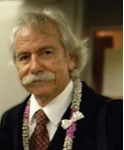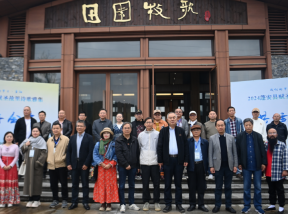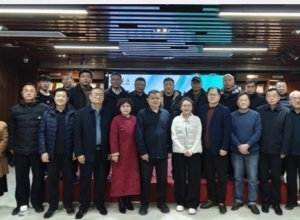本帖最后由 杨宗泽 于 2025-5-6 15:42 编辑
弗兰克·斯图尔特诗选(一) 杨宗泽 编译
Selected Poems of Frank Stewart (Set One) Compiledand translated by Yang Zongze
定罪 —— 俄罗斯帝国,卡尔斯,1912年
他们问那只鸟是否已经死了 ——因为他们都饥肠辘辘 一个男孩把鸟捡了起来 小心翼翼地整理它的翅膀 我们中任何人都本来可以说不 但男孩把鸟抓得更紧了 这时,马鞍发出吱呀的声响 引得他们回头观望 所以没人看到接下来发生了什么 起初,在他们看来 那个骑马的人很了不起 吓得他们不敢吱声
Conviction
They asked if the birdwas dead —because they were allstarving then a boy picked itup and carefullyrearranged its wings any of us could havesaid no the boy clutched thebird tighter then a creaking saddle caused them to lookbehind so no one saw whathappened next the rider seemed tothem wonderful at first and took their breathaway Kars, Russian Empire, 1912 夜晚 ——奥斯曼帝国,艾瓦勒克,1914年
他们徒步走了五六个小时, 最终抵达一个叫瓦拉尼迪亚的地方。 一些人睡在手推车里,一些人躺在地上。 夜晚来临,土耳其人来了, 他们想把所有的女孩都带走。 护送他们的警察进行了抵抗, 男女老少也都极力反抗, 所以土耳其人没能把女孩们带走, 不过,那天晚上大家都没敢睡觉。
Night
Then they walked for 5 or 6 hours until they reached a place called Valanidia. Some slept in the carts, while others lay on theground. During the night the Turks came. They wanted totake all the girls. But the policemen escorting them resisted, as well as the others, young and old, and they didn't take them and no one slept. Ayvalik, Ottoman Empire, 1914 我告诉你 ——奥斯曼帝国,霍姆斯,1914年
土耳其人征召了我的父亲入伍 这使我们免于被围捕。 你瞧,霍姆斯的地方长官 给村长下达了一道命令 要“毒死所有的狗”,这意思是 要除掉我们所有亚美尼亚人。但那位村长, 杰马尔·帕夏,他同情我们。 他命令警察 杀掉街上所有的流浪狗, 就这样我们得救了。然后他又下令 所有亚美尼亚人都必须改名。 * 霍姆斯是叙利亚的第三大城市。——译者注。 I Tell You
TheTurks conscripted my father
And this saved us from being rounded up. Yousee, the governor in Homs
Sent the village prefect an order To“poison all the dogs,” which meant
Us Armenians. But the prefect,
Djemal Pasha, knew us. Heordered the police
To kill all the stray dogs in the streets. Sowe were saved. Then he ordered
All the Armenians to change their names. Homs, Ottoman Empire, 1914 妈妈 ——1914年,奥斯曼帝国,霍姆斯
那天夜里,我们无处可眠。 妈妈睡在地上, 姐姐和我 坐在妈妈身旁 梳理着她的头发。一位妇人路过, 看着我们说道: “哎呀,可怜的宝贝们, 你们不知道,你妈妈已经去世了。” 那时我们还是孩子,怎会知道这些呢? Mother
Thatnight there was nowhere to sleep
Mother slept on the ground
My sister,Khatoun, and I
Sitting near mother
Braiding her hair. A woman passing
Looked at us said
“Why, the poor darlings,
They don’t know their mother has died.”
We were children, how could we know that? Homs, Ottoman Empire, 1914
醒悟 ——安卡拉,奥斯曼帝国,1915年12月
你似乎还不明白我们想要什么, 我们想要一个没有亚美尼亚人的亚美尼亚。 Wake Up
Youdon’t seem to understand what we want.
We want an Armeniawithout Armenians. Ankara, Ottoman Empire, December, 1915
瓦尔达瓦尔节盛宴 ——奥斯曼帝国,1915年
土耳其人点燃了那座 挤满村民的教堂 醉醺醺的士兵们跳起了狂欢舞 他们挥舞着马刀,捶打着胸膛 歇斯底里地唱着: “走啊,我的孩子,走啊! 跳舞吧,孩子们,跳舞吧!” 我真希望我的双眼已经失明, 那样我就不会看到这一切。 我们逃了出来,我敢说, 在我眼里,他们就是野兽! *瓦尔达瓦尔节:亚美尼亚的一个传统节日,具有狂欢节的意味,通过泼洒玫瑰水来表达爱,祈求神灵驱赶**,保护爱和美。——译者注。 TheFeast of Vardavar
Afterthe Turks lit the church
Packed with villagers
Intoxicated and merry soldiers danced
Swinging their sabers, beating their chests
They sang
yürü yavrum, yürü!
Dance, children, dance!
I wish my eyes had become blind
So that I would not see.
We escaped but I swear
To me they looked like wild beasts. Ottoman Empire, 1915 在火车站 ——奥斯曼帝国埃尔津詹城外,1915年
在火车站,我们看到他们在苦苦哀求: “不!等等!我们愿意成为穆斯林!我们 愿意成为德国人!我们愿意成为 任何你们想要的样子!”接着火车把他们 带到了凯马海峡,在那里他们的喉咙被割开了。 *埃尔津詹城:土耳其东部的一座城市。——译者注。 At the Train Station
Atthe train station, we saw them pleading,
“No! Wait! We will become Muslims! We
will become Germans! We will become
anything you want!” Then the train took them
to Kemah Passwhere they cut their throats. OutsideErzincan, Ottoman Empire, 1915 勇敢的姑姑 ——(背景为)奥斯曼帝国,1915年
我们往离城镇更远的地方走去, 来到了一片开阔的田野。我们看到 所有的牲畜都聚集在那里, 我们的羊、牛、马等等。 我姑姑跳过栅栏, 走到我们的牛群旁边,拥抱它们。 那时候,道路的两旁站着很多哨兵, 以确保没有人偏离路线, 不让每一个士兵掉队。
My Brave Aunt
Farther from the town we reached
An open field. We saw all
The animals had been gathered there, Our sheep, cows, horses, and so on.
My aunt jumped over the fence
And went over to our cows, hugging them. Butthere were soldiers on both sides of
The road to make sure no one swerved
And everyone kept up. Ottoman Empire, 1915 这就是原因 ——奥斯曼帝国,1915年
我们能弄到面粉的时候 父亲就揉面 然后把草煮熟,切碎 与面粉混合在一起 往里面加上盐和胡椒粉 接着我们就会把它吃掉。当 你饥不可耐的时候,草 比蜂蜜或牛排还好吃
That’s Why
When we could get flour Our father would knead it And boil the grass, chop it, And salt and pepper the flour And we would eat it. When You are hungry, grass is Better than honey or steak Ottoman Empire, 1915
【作者简介】弗兰克·斯图尔特:美国著名诗人、翻译家、学者和文化活动家;自1989年始,弗兰克一直在致力于一本名叫《马诺阿》(音译)的文学期刊的编译和出版,该期刊重点译介美洲及亚太地区当代作家的作品,旨在推动文学的国际化、全球性对话和文学的伦理想象。弗兰克已有十多部著作出版,其中诗集五本;此外,他还翻译了包括吉狄马加在内的众多世界当代著名诗人的诗作,并以《诗歌后面的诗歌》为名结集出版。弗兰克现为夏威夷大学英文教授,其诗歌作品曾获美国怀廷文学奖和夏威夷州政府文学奖等重要奖项, 值得特别一提的是,弗兰克于2021年出版的诗歌专集《依然在逃》。在这本书里,弗兰克用诗歌的方式对于二十世纪以来的种族灭绝暴行、战争以及战争给人类带来的苦难予以梳理、审视和批判,旨在借以推动人类之间持久的和平和友谊。这本诗集以其具有良知的学者和诗人的独特的审视角度在当代世界诗坛独树一帜,堪称弗兰克诗歌写作中的扛鼎之作,也是当下世界诗坛上一颗闪耀着人性光芒的诗歌星辰。
[Aboutthe Author] Frank Stewart: Arenowned American poet, translator, scholar, and cultural activist. Since 1989,Fr ank has been dedicated to the compilation, translation, and publication of aliterary journal titled Manoa. This journal focuses ontranslating and introducing the works of contemporary writers from the Americasand the Asia-Pacific region, aiming to promote the internationalization ofliterature, global dialogue in literature, and the ethical imagination inliterary works. Frank has published more than ten works, including fivecollections of poetry. In addition, he has translated the poems of manyworld-renowned contemporary poets, including Jidi Majia, and compiled thesetranslations into a collection titled The Poetry behind Poetry. His workshave won important awards such as the Whiting Award and the Literary Award ofthe Hawaii State Government. Currently, Frank serves as a professor of Englishat the University of Hawaii. It isparticularly worth mentioning that Frank published a collection of poems titledStillAt Large in 2021. In this book, Frank uses poetry to sort out, examine,and criticize the genocide atrocities, the war and the sufferings brought bythe war to humanity since the 20th century. Its aim is to promote lasting peaceand friendship among human beings. With its unique perspective of examination,this poetry collection stands out in the contemporary world poetry scene with theprofound humanistic concern for all of humanity of a conscientious scholar andpoet. It can be regarded as a masterwork in Frank's poetry writing, and is alsoa shining star in the current world poetry circle, radiating the brilliance ofhuman nature as well.
【译者简介】杨宗泽 (1953 — )笔名:瘦路,山东平度人,毕业于山东师范大学外文系英美语言文学专业,中学退休教师,无党派,中国作家协会会员,诗人,翻译家,后意象主义诗歌流派代表性诗人之一。1999年12月被美国世界作家艺术家协会评选为1999年度最佳翻译家,2024年12月被《中国当代诗歌导读》编委会授予第七届诗歌奖。已有诗集《浪漫季节》、《沉浮》和诗歌翻译集《贺敬之短诗选》、《吉狄马加诗选》、《桑恒昌短诗选》、《伊曼纽尔•马休诗选》等33种著作在国内外出版。杨宗泽的诗关注人生和人性、关注现实和社会问题、关注底层社会的生存状态。
Yang Zongze (1953 — ), his pen name: Narrow Path;was born in Pingdu City, Shandong Province; graduated from English Language andLiterature Department of Shandong Normal University; retired middle schoolteacher; nonparty; poet, poetry translator, one of the representative poets ofthe post-Imagist poetry school. In December 1999, he was selected as the BestTranslator of 1999 by the American Society of World Writers and Artists. InDecember 2024, he was awarded the title of excellent poet of the Seventh PoetryAward by the editorial board of the Guide for Reading of Chinese ContemporaryPoetry. Thirty-two books of his have been published at home and abroad,including a collection of poems titled MyRomantic Season and Winter WithoutSnow,and collections of translatedpoems titled Selected Poems of HeJingzhi, Selected Poems of Jidi Majia, Selected Poems of Sang Hengchang and Selected Poems of Emmanuel MAHIEU. Yang Zongze's poetry focuses onlife and human nature, realistic society and important societal issues as wellas the living conditions of the bottom society.
| 



















